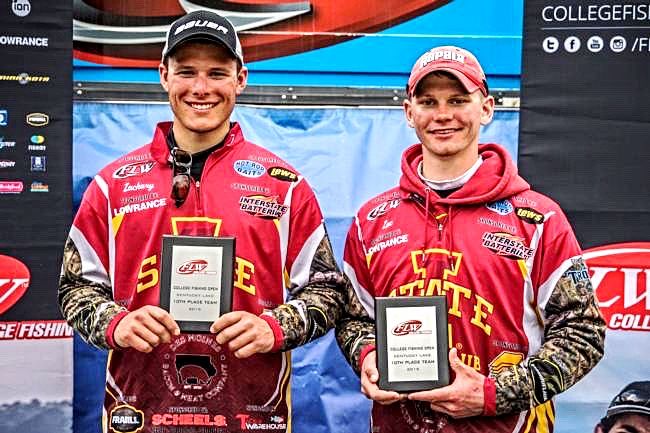Big catch helps ISU fishing club advance
Zach Hartley, left, and Zac Beek
April 1, 2015
Zac Beek and Zach Hartley, who both hail from Minnesota, set off from the Land of 10,000 Lakes to a different lake about 615 miles south.
Beek and Hartley are just two of the several ISU fishing club members who headed to Kentucky Lakes during Spring Break to compete in the Kentucky Lakes Open, an event sponsored by the Fishing League Worldwide.
The two are in a position that they couldn’t have imagined just a year ago. Last year, Hartley, a freshman, was lacing up his skates as a member of the Merritt Centennials in the highly touted British Columbia Hockey League. He was just a kid chasing his dream of reaching hockey stardom, but the unthinkable happened. Hartley’s career was cut short when he had to have double-hip replacement surgery.
“Having hip surgery ended my career, but it also started a new one,” Hartley said. “The doors opened and I’m glad they did.”
Beek, a sophomore, who also played hockey in high school, was busy getting involved in the greek life at Iowa State and opted not to join the fishing club until this year.
“Once I found out that [Zach] Hartley was joining the club, I jumped at the opportunity to team up with him, and I’m glad I joined,” Beek said.
These two have become the first ISU fishing club members to qualify for nationals. During the two-day tournament at Kentucky Lakes, they caught 9 fish for a total of 32 pounds and 14 ounces. This put them in the top 10, which made them eligible to qualify directly for the 2016 national tournament.
The Kentucky Lake Open was one the biggest fishing tournaments in Fishing League Worldwide history. 201 teams entered from various schools around the country, with Iowa State entering six teams.
“This event was the first of its kind,” said junior Dustin Kroening, club president. “Never before has there been a tournament of this size or caliber.”
The two-day tournament was set up with the top 10 teams advancing straight to nationals. Each boat had to catch the five biggest fish they could on the first two days. The total combined score from the 10 fish then determined which teams would advance. At the end of the first day, Hartley and Beek weighed in with a total of 18 pounds and 11 ounces, which placed them 14th.
“After day one, we had a strong feeling that we could place in the top 10,” Hartley said. “It felt really good to have a strong first day and our homework has payed off.”
Leading up to the tournament the two did hours of homework on Kentucky Lake. They studied what lures or bait the fish will bite, what rod and reel to use, line setups and even called fishermen who have had experience on Kentucky Lake.
“The homework that we do on every single lake is what makes us athletes. It’s just like golf, where most of it is mental, while the rest is skill,” Beek said. “You also need a little luck mixed in too. Every sport has luck.”
Being put in a situation where it could advance, the team had to scramble for a plan that could push it into the top 10. They ran the same pattern as day one in hopes on catching big bites, but they nearly didn’t get enough bites.
With only 20 minutes left until their weigh in, they only had three fish in their boat. With only three, there was no chance of advancing, but then they got a bite. This one proved to be the game changer, as it put them narrowly into the top 10 and earned them a trip to nationals.
“We were flying around on the seam of our pants trying to catch the last two fish,” Beek said. “I’m just glad that fourth one bit or else we wouldn’t have moved on.”
Hartley and Beek weren’t the only ones having troubles catching fish on day two. Going into Saturday, they knew it was going to be slow, but if it’s slow for one boat, then it’s slow for all the boats. Going into the weigh in, the team figured they wouldn’t place well with only four fish, but everyone else’s slow day factored into that too.
“I was more pumped than a 10 year old at a birthday party once we found out we were advancing,” Beek said. “I expected a top-50 finish, but this is just amazing.”
The ISU fishing club was formed in the early 2000s and have never had a team reach nationals. While the club has been good, it just couldn’t reach that next level. Kroening says the club is mainly males, but says there are a few females, and that he hopes the numbers keep increasing.
While the wait to find out where the national tournament will take place, they will be busy competing in other events. After all, this was only the second time they’ve ever fished together. They have a lot more to learn about each other if they want to win nationals.
“We make a great team, but we still don’t know much about how one another fishes,” Hartley said. “Over time we will only get better and make an even stronger team.”







